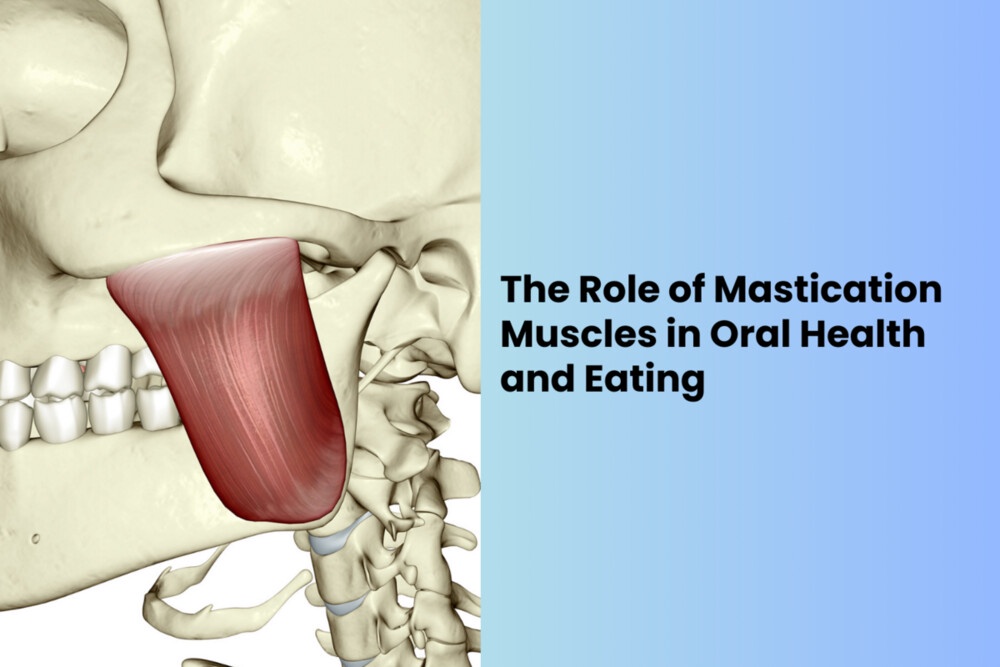The Muscles of Mastication play a crucial role in our oral health and eating habits. These muscles, primarily responsible for the movement of the jaw during chewing, are integral not only to our ability to process food but also to maintaining the health and function of our oral structures.
Understanding the Muscles of Mastication
The muscles of mastication include the masseter, temporalis, medial pterygoid, and lateral pterygoid muscles. These muscles work in coordination to enable the jaw's complex movements, including elevation, depression, protraction, retraction, and lateral movements. Each muscle has its specific role:
- Masseter Muscle: This is the most visible muscle, located at the angle of the jaw. It's the primary muscle for elevating the jaw, playing a vital role in biting.
- Temporalis Muscle: Situated on the side of the head, this fan-shaped muscle assists in elevating and retracting the jaw, contributing to the crushing and grinding of food.
- Medial Pterygoid Muscle: This muscle works in tandem with the masseter to elevate the jaw and also assists in side-to-side movement.
- Lateral Pterygoid Muscle: Unique among the mastication muscles, it primarily aids in opening the jaw and moving it side-to-side.
Role in Oral Health
The muscles of mastication are essential in maintaining oral health. They help in the efficient breakdown of food, which is the first step in digestion. Properly chewed food reduces the risk of choking and aids in better digestion, as it allows for more effective mixing with saliva, containing enzymes that begin the digestive process.
These muscles also play a role in maintaining the alignment and health of the temporomandibular joint (TMJ). The TMJ connects the jawbone to the skull, and its health is crucial for pain-free jaw movement. Dysfunction in the muscles of mastication can lead to TMJ disorders, which can cause pain, difficulty in moving the jaw, and even headaches.
Impact on Eating Habits
The strength and functionality of the muscles of mastication directly impact our eating habits. Strong and healthy muscles allow for a diverse diet, including harder foods like raw vegetables and nuts, which are beneficial for overall health. In contrast, weakened mastication muscles might limit a person's diet to softer foods, potentially leading to nutritional deficiencies.
Chewing also plays a vital role in satiety – the feeling of fullness. Studies have shown that thorough chewing can reduce overall food intake, as it gives the body time to process signals of fullness. This aspect is particularly important in weight management and maintaining a balanced diet.
Common Issues and Their Management
Common issues related to the muscles of mastication include muscle fatigue, spasm, and hypertrophy. These can result from excessive chewing (like gum chewing), teeth grinding, or clenching, often linked to stress.
To manage these issues, it's important to practice good oral habits, such as avoiding excessive gum chewing and being mindful of teeth grinding, especially at night. Relaxation techniques and stress management can also help in reducing involuntary clenching and grinding. In some cases, dental interventions like mouthguards or orthodontic treatments may be necessary.
The Importance of Regular Dental Check-Ups
Regular dental check-ups are crucial for maintaining the health of the muscles of mastication. Dentists can identify early signs of muscle dysfunction or TMJ disorders and recommend appropriate treatments or interventions. They can also provide guidance on proper chewing techniques and habits to maintain muscle health.
Conclusion
The muscles of mastication are more than just functional components for eating; they are integral to our overall oral health and well-being. Understanding their role and taking steps to maintain their health can lead to better digestion, a more varied diet, and prevention of related disorders. As with any aspect of health, prevention and early intervention are key, making regular dental check-ups an essential part of maintaining the health of these vital muscles.


No comments yet